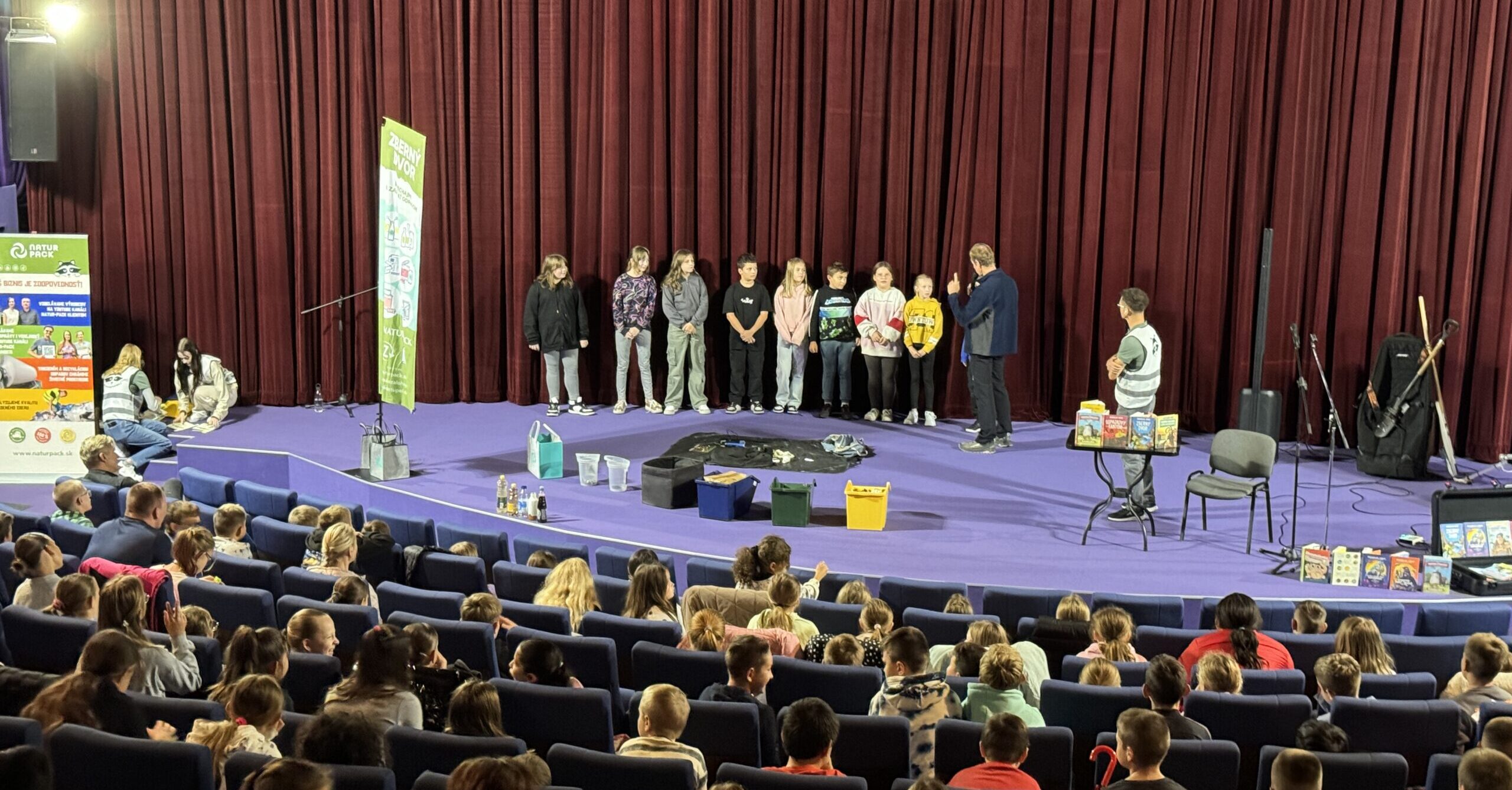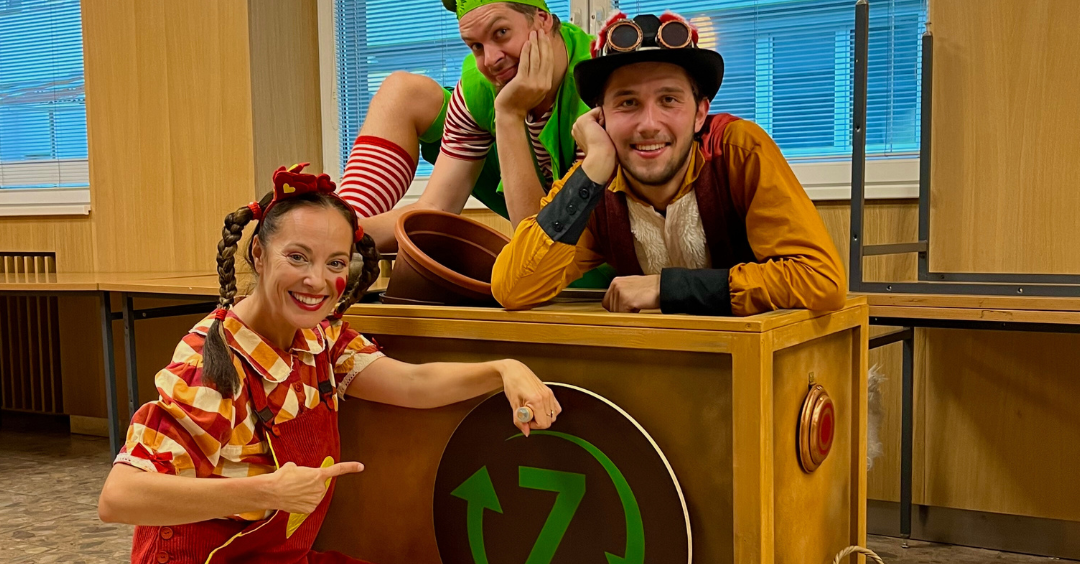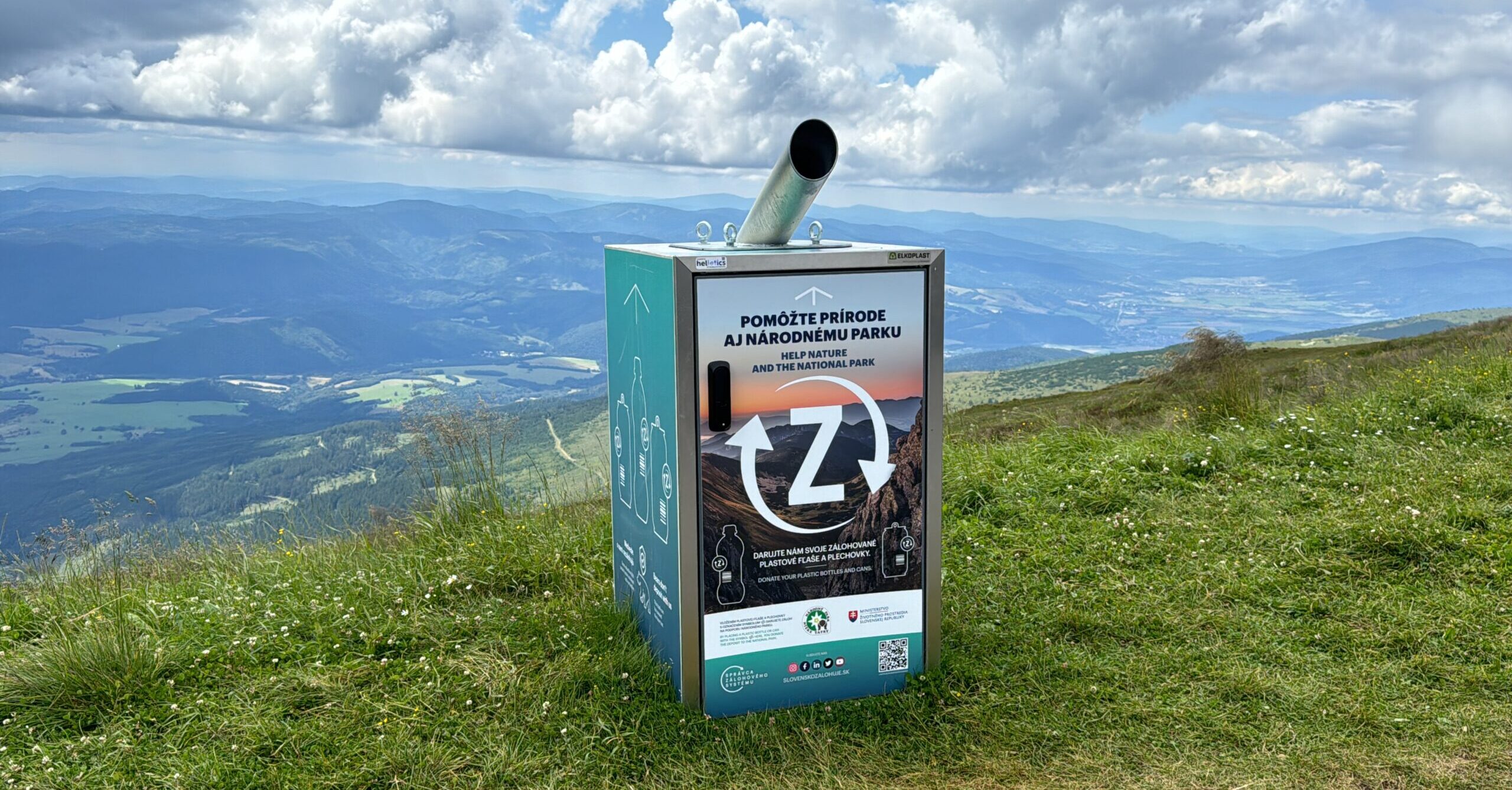O zálohovaní
Zaujíma vás,
čo je nové vo svete
zálohovania?
Tu nájdete všetky informácie zo sveta zálohovania, ktoré vám priblížia naše aktivity a fungovanie zálohového systému.
Povinné zverejňovanie
Dokumenty na stiahnutie
Pre spotrebiteľovČasto kladené otázky
Od spotrebiteľov

What is the deposit return system?
It is a modern means of extended producer responsibility, which, through the collection of disposable beverage packaging (plastic bottles and cans), enables their reprocessing for the production of new packaging and recovery, involving the general public to the maximum extent possible in the fight against the littering of beverage packaging waste and mobilising them to protect the environment.
What are the advantages of the deposit return system?
Depositing is a tool that can increase the amount of plastic bottles and cans collected to more than 90% and it also contributes to reducing the amount of litter. The deposit return system uses the principle of the circular economy, closing the material circle “pet-to-pet” and “can-to-can”, thus saving natural resources.
When was the deposit return system launched in Slovakia?
Slovakia has been depositing since 1 January 2022.
Which packaging is subject to the deposit return system?
Plastic PET beverage bottles and cans from 0.1 l to 3 l (inclusive) marked with the symbol (Z) in recycling arrows with the text “ZÁLOHOVANÉ”. For example, we collect packaging from mineral water, sweetened beverages, fruit juices, iced teas, energy drinks, beer, wine and mixed alcoholic beverages. We do not collect containers of milk, milk-containing beverages, syrups, or alcoholic beverages with more than 15 percent alcohol content.
How do I recognise returnable packaging?
When buying beverages in plastic bottles and cans, it is necessary to note whether their printing contains a graphic symbol (Z) in recycling arrows, which should be placed near the barcode (EAN) with the text “ZÁLOHOVANÉ”.
What is the amount of the deposit and why?
The deposit amount is 15 eurocents for plastic bottles and cans alike. The amount of the deposit is designed not to put too much strain on your wallet and at the same time to be motivating enough.
How can I return the returnable beverage packaging?
Returnable packaging can be returned at any marked collection point without residual liquid as uncompressed plastic bottles with lids. Care must be taken to ensure that the barcode remains legible.
Where can I return returnable packaging?
You can return the returnable packaging at any marked collection point, regardless of where you bought the beverage. Returnable packaging is collected at the collection points via reverse vending machines and, in smaller outlets, by means of a manual scanner, e.g. at the checkout. For a map with a list of collection points, see the Map of Collection Points subpage.
When will I get my deposit back?
After returning the packaging to any marked collection point. The reverse vending machine or the retailer in person will issue you a token with the value of the deposit for the returned packaging. This can then be redeemed at the cash desk of the same store. Smaller establishments voluntarily participating in the deposit return system have an exemption from the law. They don’t have to refund the value of the cash deposit, they can just give a discount on the purchase applied at the same place where the packaging was returned.
What subsequently happens to the packaging?
The packaging is transported to a sorting centre where it is sorted by material type and colour and then compacted into large cubes weighing approximately 300 kg. They are then sent for processing, known as recycling. This material can be used to make new plastic bottles and cans for beverages. Again and again.
What happens if I throw the packaging in the yellow container for sorted waste?
If you throw your returnable packaging in separate waste, you lose the deposit. The opportunity to process this used beverage packaging into new plastic bottles and cans, thus saving natural resources, is lost.
What to do with plastic bottles and disposable beverage cans without the graphic symbol Z and the text “ZÁLOHOVANÉ”?
Only uncompressed beverage packaging marked with the graphic symbol (Z) in the recycling arrows and the text “ZÁLOHOVANÉ” can be returned at the marked collection point. Packaging without this marking must be disposed of compacted in yellow containers for sorted waste, just as before.
Who manages the deposit return system?
The Správca zálohového systému, a non-profit organization, created by a consortium of 4 entities—AVNM, SZVPS, SAMO and ZOSR, which represent producers of soft beverages and mineral waters, beer producers and representatives of the wholesale and retail trade. Together, their members market nearly 80% of all returnable packaging and represent more than 3,000 commercial outlets.
How is the deposit return system financed?
The deposit return system is financed by producers’ fees, material sales and uncollected deposits. The established deposit return system is normally in deficit and, as it is an extended producer responsibility system, the management deficit is always financed by the producer charges.
Who regulates and controls the deposit return system?
Ministry of the Environment of the Slovak Republic.
Why are only plastic beverage packaging and cans subject to the deposit return system?
The deposit return system in Slovakia starts with single-use plastic bottles and cans, which has been most successful abroad. Moreover, in Slovakia, we are building on the returnable glass packaging deposit system that we have known for years. We can learn from it, stabilise and develop the system.
What happens to plastic bottles and cans that are not returned via the deposit return system?
If consumers do not return the packaging to the collection point, they lose the deposit and also the possibility to put the packaging back into circulation as a new bottle or can.
Why not start using biodegradable plastics straight away?
All packaging has an impact on the environment, and the deposit return system provides a solution that can currently reduce the amount of waste, and increase the percentage of plastic bottles and cans that are put back into circulation which do not end up as litter. This will reduce the environmental impact, and can already be applied today. Biodegradable plastics are an alternative that requires a complete infrastructure from sorted collection to recycling to end-of-life treatment.
Why don’t we go back to glass bottles instead of plastic ones?
There are many practical advantages to using plastic packaging as it is lighter and more storable. All packaging has an impact on the environment, for example the production and recycling of glass consumes much more CO2 than the production and recycling of plastics. For example, the use of disposable non-returnable glassware for beverages is the worst option in terms of environmental impact. The life cycles of a plastic bottle containing recycled material and one containing returnable glass have been shown as being comparable in terms of environmental impact. The introduction of the deposit return system is clearly a solution that will help reduce the environmental impact of plastic beverage packaging by ensuring maximum collection, recycling and subsequent reuse of the material for the same purpose—pet-to-pet and can-to-can.
Doesn’t the deposit return system increase the price of beverages?
The deposit return system does not affect the price of beverages. We pay a deposit of 15 eurocents at the time of purchase and receive a full refund when the packaging is returned.
Wouldn’t a higher deposit be more motivating?
The amount of the deposit of 15 euro cents was determined on the basis of analyses so that it would be sufficiently motivating while at the same time not too financially burdensome for Slovak consumers.
What happens to the unreturned deposit?
The deposit return system is a fair and transparent system that engages producers, retailers and consumers in the fight against litter, all under the supervision of the state—the Ministry of the Environment of the Slovak Republic. If the consumer chooses not to return the packaging at the collection point, the unclaimed deposit becomes revenue of the deposit return system. The Správca zálohového systému is a non-profit organisation and is obliged by law to use any surplus management exclusively for the development and improvement of the deposit return system.
Even in a deposit return system, can the collected beverage packaging end up in an incinerator somehow?
No. Each package in the deposit return system is registered and traceable from the moment it is placed on the market to its recycling and use in the production of new packaging. This is the case in all countries where a deposit return system exists, so all collected beverage packaging are demonstrably recycled and can also be used to produce new packaging. These are valuable materials that do not have to end up in nature or in an incinerator, but can be used to make new packaging for the same purpose, thus saving natural resources.
What about other plastic food or chemists’ packaging?
Plastic packaging other than beverage packaging is collected through the sorted collection system as before and belongs in the yellow collection container.
What about the return of beverage containers in smaller villages and the countryside in general?
Small shops in rural areas are also gradually being registered as collection points in the deposit return system, so that plastic bottles and cans can be returned throughout Slovakia in cooperation with retailers, who are thus accommodating their customers. If there is no collection point in your municipality, you can help to expand the system by informing a shop near you about the possibility of joining the deposit return system. We will be happy to advise you on how to proceed. Contact us via the form at slovenskozalohuje.sk.
What to do if the reverse vending machine does not accept returnable beverage packaging?
If the reverse vending machine does not accept the beverage packaging, even though it is marked with the Z symbol in the recycling arrows with the text “ZÁLOHOVANÉ”, is undamaged, uncompressed, empty and has a legible barcode, it is necessary to contact directly the responsible employee at the collection point in question.
Do I pay the deposit at all stores?
Every retailer who sells beverages in plastic bottles and cans is obliged to deposit them, to keep the deposit amount of 15 eurocents and to indicate it separately on the price tag and the receipt.
Do I have to return the returnable beverage container at the store where it was purchased?
You can return the returnable packaging in any shop that is involved in the deposit return system and has an established collection point, regardless of where the consumer bought the goods in Slovakia. You can find your nearest collection point on the Map of Collection Points subpage.
Can I redeem a token from the reverse vending machine at another collection point?
Unless a specific store network has a different set-up, the token issued to you by the reverse vending machine can only be redeemed at the location where you returned the packaging. The token is redeemable within the general limitation period, i.e. within 3 years of issue.
I want to collect the deposit for the returned packaging in the form of cash, but the store only wants to give me a discount on the purchase; is this permitted?
Small food stores, with a floor area of less than 300 m², which are voluntarily participating in the deposit return system, are exempted from the law. They don’t have to give the customer a cash refund, they can just give a discount on the purchase. The discount or cash can only be redeemed at the store where the customer returned the returnable packaging.
Why do I have to return the packaging uncompressed when the reverse vending machine compresses them anyway?
For the registration of packaging and control of its flow in the deposit return system, it is important that the reverse vending machine can recognise the shape of the packaging and a readable barcode. The returnable packaging therefore has to be collected uncompressed, empty and with a legible barcode. The packaging is then compressed in the reverse vending machine to save space, make transport more environmentally friendly and protect against possible fraud.
Why is plastic packaging from syrups, milk, vinegar or oil not being subject to the deposit return system?
The deposit return system started with the category of beverages that are the most efficient for recycling and subsequent reuse and for which stricter environmental protection targets are set at the level of the Slovak Republic and the European Union. The decision on which packaging is to be subject to the deposit return system is the responsibility of the state—the Ministry of the Environment. We anticipate that once the deposit return system is up and running, systems for other plastic food packaging will be developed and the beverage sector will become an inspiration for other food sectors.
Chcem viac informácii ako
Na to, aby sme v Trnave vysadili nové stromčeky, stačí málo – tvoja prázdna zálohovaná PET fľaša či plechovka.
Tento rok na Ekofeste všetky vyzbierané zálohované obaly premeníme na stromy. 💚
📍 Prines ich 30. mája na Ekofest v areáli Slávia v Trnave a vhoď do takýchto špeciálnych nádob. O zvyšok sa postaráme my. Výťažok z darovaných záloh poputuje na výsadbu stromov v Trnave – v Kamennom mlyne, na „štreke“ aj na sídliskách. 🌲
🎶 A že to bude poriadna zábava? Čakajú ťa koncerty Zoči Voči, BijouTerrier, Hudba z Marsu, Braňo Jobus a mnoho ďalších.
Vstup je zadarmo a program bohatý.
👉 Už vieš, koho vezmeš so sebou?
#slovenskozalohuje #zalohovanie #zflasedoflase #zplechovkydoplechovky #cirkularita #ekofest

Na to, aby sme v Trnave vysadili nové stromčeky, stačí málo – tvoja prázdna zálohovaná PET fľaša či plechovka.
Tento rok na Ekofeste všetky vyzbierané zálohované obaly premeníme na stromy. 💚
📍 Prines ich 30. mája na Ekofest v areáli Slávia v Trnave a vhoď do takýchto špeciálnych nádob. O zvyšok sa postaráme my. Výťažok z darovaných záloh poputuje na výsadbu stromov v Trnave – v Kamennom mlyne, na „štreke“ aj na sídliskách. 🌲
🎶 A že to bude poriadna zábava? Čakajú ťa koncerty Zoči Voči, BijouTerrier, Hudba z Marsu, Braňo Jobus a mnoho ďalších.
Vstup je zadarmo a program bohatý.
👉 Už vieš, koho vezmeš so sebou?
#slovenskozalohuje #zalohovanie #zflasedoflase #zplechovkydoplechovky #cirkularita #ekofest
💡 Vedeli ste, že po celom Slovensku máme už vyše 3 545 odberných miest, kde môžete pohodlne vrátiť svoje zálohované PET fľaše a plechovky? ♻️
🔍 Zaujímavosť: vďaka Vám sme ku dňu 15. 05. vyzbierali neuveriteľných 3 390 452 903 obalov!
🌍 To je dôkaz, že zálohovanie má zmysel, ďakujeme, že zálohujete. 💚
#slovenskozalohuje #spravcazaloh #zalohujemespolu #zalohovanie #ekologianaslovenku #zeleneslovensko #vratflasuvratzivot #cistakrajina #instagood #instagram #photooftheday #photography

💡 Vedeli ste, že po celom Slovensku máme už vyše 3 545 odberných miest, kde môžete pohodlne vrátiť svoje zálohované PET fľaše a plechovky? ♻️
🔍 Zaujímavosť: vďaka Vám sme ku dňu 15. 05. vyzbierali neuveriteľných 3 390 452 903 obalov!
🌍 To je dôkaz, že zálohovanie má zmysel, ďakujeme, že zálohujete. 💚
#slovenskozalohuje #spravcazaloh #zalohujemespolu #zalohovanie #ekologianaslovenku #zeleneslovensko #vratflasuvratzivot #cistakrajina #instagood #instagram #photooftheday #photography
🌞 Otvorenie letnej kúpeľnej sezóny 2025 v Kúpeľnom parku Sliač.🏖️
💦 Na otvorení sezóny sme nielen zbierali zálohované PET fľaše a plechovky, ale spoločne sme aj pomáhali prírode.
🤩 Každý obal, ktorý ste nám darovali, sa premení na výsadbu nových stromčekov.🌳
🤗 Ďakujeme všetkým návštevníkom, ktorí sa zapojili – aj vďaka Vám je Slovensko čistejšie a budúcnosť zelenšia.
#slovenskozalohuje #spravcazaloh #zalohujemespolu #zalohovanie #ekologianaslovenku #zeleneslovensko #vratflasuvratzivot #cistakrajina #kupele #sliac #strom #stromy #flasa #plechovka #instagood #instagram #photooftheday #photography

🌞 Otvorenie letnej kúpeľnej sezóny 2025 v Kúpeľnom parku Sliač.🏖️
💦 Na otvorení sezóny sme nielen zbierali zálohované PET fľaše a plechovky, ale spoločne sme aj pomáhali prírode.
🤩 Každý obal, ktorý ste nám darovali, sa premení na výsadbu nových stromčekov.🌳
🤗 Ďakujeme všetkým návštevníkom, ktorí sa zapojili – aj vďaka Vám je Slovensko čistejšie a budúcnosť zelenšia.
#slovenskozalohuje #spravcazaloh #zalohujemespolu #zalohovanie #ekologianaslovenku #zeleneslovensko #vratflasuvratzivot #cistakrajina #kupele #sliac #strom #stromy #flasa #plechovka #instagood #instagram #photooftheday #photography
🤓 V našom Triediacom centre pravidelne sprevádzame skupiny žiakov a študentov. Tentokrát sme priviltali základnú školu spod Tatier, zo Štrby. 🏔️Dozvedeli sa všetky informácie o tom ako funguje Triediace centrum, čo sa deje s obalmi na linke a kam ich posielame ďalej. 😎
💡Cieľom je ukázať, akým spôsobom je nastavený systém logistiky zálohovaných obalov a ako spracovávame obaly a pripravujeme na ďalšie spracovanie. ♻️

🤓 V našom Triediacom centre pravidelne sprevádzame skupiny žiakov a študentov. Tentokrát sme priviltali základnú školu spod Tatier, zo Štrby. 🏔️Dozvedeli sa všetky informácie o tom ako funguje Triediace centrum, čo sa deje s obalmi na linke a kam ich posielame ďalej. 😎
💡Cieľom je ukázať, akým spôsobom je nastavený systém logistiky zálohovaných obalov a ako spracovávame obaly a pripravujeme na ďalšie spracovanie. ♻️





Follow us